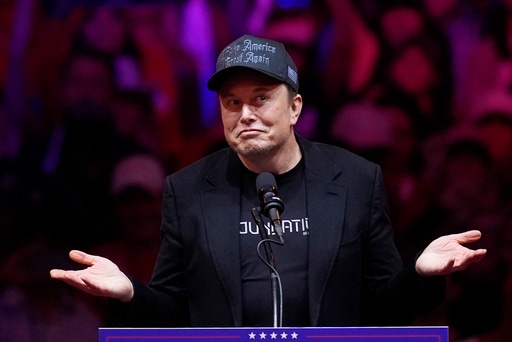Pennsylvania challenge of Elon Musk’s $1M-a-day voter sweepstakes moves back to state court

Elon Musk speaks before Republican presidential nominee former President Donald Trump at a campaign rally at Madison Square Garden, Sunday, Oct. 27, 2024, in New York. (AP Photo/Evan Vucci)[ASSOCIATED PRESS/Evan Vucci]
PHILADELPHIA (AP) — A legal fight over Elon Musk’s $1 million-a-day voter sweepstakes is back in state court in Pennsylvania, a loss for the billionaire, after a federal judge said Friday that he doesn’t have jurisdiction.
Philadelphia District Attorney Larry Krasner wants to keep his fight to shut down the giveaways in state court, calling it a violation of state lottery laws. Musk had argued that the case belonged in federal court as it involves claims of federal election interference. A judge scheduled a hearing for 10 a.m. Monday. It wasn’t immediately clear whether Musk would attend though Krasner previously argued that Musk should have to appear in court.
Musk’s political organization, which aims to boost Donald Trump’s presidential campaign, has organized the sweepstakes as a way of encouraging people to be registered voters in key battleground states.
With just days to go until Tuesday’s presidential election, the case now returns to Judge Angelo Foglietta, who held a brief hearing Thursday in a courtroom at Philadelphia City Hall. No further hearings were immediately scheduled.
U.S. District Judge Gerald J. Pappert, a Republican former Pennsylvania attorney general appointed to the federal bench by President Barack Obama, issued Friday’s ruling.
“Defendants argue the complaint’s references to ‘the forthcoming Federal Presidential Election’ show the lawsuit necessarily raises questions of federal law. But federal question jurisdiction does not turn on a plaintiff’s motivations in filing suit; it turns on whether the legal issues arising from the claims originate in federal or state law,” Pappert wrote.
Krasner lawyer John Summers, in a statement, said he will now ask Foglietta “to enter an injunction to stop the defendants’ lottery and the defendants’ unfair and deceptive practices.” Matthew Haverstick, a lawyer for Musk, did not immediately respond to text and phone messages seeking comment.
Musk, who owns Tesla, SpaceX and X, has gone all in on Trump this election, saying he thinks civilization is at stake. He is undertaking much of the get-out-the-vote effort for Trump through his super PAC, which can raise and spend unlimited sums of money. He has committed more than $70 million to the super PAC to help Trump and other Republicans win in November.
Krasner accused Musk and his PAC in his lawsuit filed Monday of running a dubious lottery in the tense run-up to Tuesday’s election. Four of the first dozen winners appeared to be from Pennsylvania, perhaps the key prize in the tight presidential race between Trump and Vice President Kamala Harris.
“Is it just a coincidence that this is the state that has the largest electoral votes? I don’t think so,” lawyer John Summers argued Thursday.
Posts by Musk’s America PAC on his X platform indicate he’s given away 13 checks of $1 million since the first one in Harrisburg, Pennsylvania, on Oct. 19. Other winners came from the battleground states of Wisconsin, Nevada, Arizona, Georgia, North Carolina and Michigan. The sweepstakes is set to run through Election Day, open to registered voters in too-close-to-call states who sign a petition supporting the Constitution.
“They’re doing things in the dark,” Summers told the judge. “We don’t know the rules being followed. We don’t know how they’re supposedly picking people at random … It’s an outrage.”
Election law experts have questioned whether it violates federal law barring payments for votes. Musk has cast the money as both a prize as well as earnings for work as a spokesperson for the group.
Krasner has said he could still consider criminal charges, as he’s tasked with protecting both lotteries and the integrity of elections.
Both Trump and Kamala Harris have made repeated visits to the state as they fight for Pennsylvania’s 19 electoral votes, and both plan several more stops there before Tuesday.
Copyright 2024 The Associated Press. All rights reserved. This material may not be published, broadcast, rewritten or redistributed without permission.